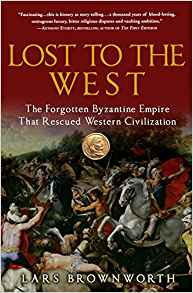 Lars Brownworth, 304 pp., Three Rivers Press.
Lars Brownworth, 304 pp., Three Rivers Press.
My interest in the Byzantine Empire was piqued by the 11th Century chronicles of Michael Psellus (see the review in a previous post), so I ordered this relatively short, recent history of the Empire’s history from the founding of Constantinople by the eponymous Illyrian badass and ardent Christian convert, Constantine the Great, to the fall of the city in 1453, her mighty walls shattered by enormous Ottoman cannon. This is a lot of material to cover and the author does so briskly while also being careful to be thorough and accurately sourced. The back jacket of the book states that Mr. Brownworth is a former high school history teacher, but he shows as much flair for writing popular, accessible history as many other, more highly accredited authors.
Like all empires from Rome onward, there is a large focus in the book on the Byzantine emperors and their personalities, an unavoidable consequence of studying any autocracy where everything (at least supposedly) turns on the word of just one man. A parade of characters passes down through the long ages, some outstanding, many contemptible, and a great deal utterly mediocre. Brownsworth makes the interesting point that as long as an emperor was strong and knew how to organize the empire’s resources (with special emphasis on the broad, fertile Anatolian plain), the Byzantines flourished or, at least, held their own. This was a remarkable feat in light of the constant series of threats posed to the empire over centuries, beset from all sides, Persians, Slavs, Bulgars, Crusaders, Arabs, and worst of all and finally, the Ottoman Turks. It was only when the Byzantines were deprived of Anatolia by the Turks that the empire truly began to falter and at last fail.
The author notes that while Western Europe was plunged into illiteracy and Frankish kings lived little better than peasants, learning and luxury still flourished in Constantinople and the empire’s other great cities. He points out that for centuries the Byzantine Empire acted as a buffer for Western Europe, a bulwark between the weak, disorganized feudal realms and the rampant forces of Islam. Much learning was gained by the West from the Byzantines, especially after the fall of Constantinople when many Greek scholars fled to Italy seeking patronage from the Pope among others. This history does a valuable service in filling in a large gap in the general picture of medieval European history.
I think the most valuable thing to be gained from this book is a sense of the remarkable strength of the Byzantine polity. Located in the very cockpit of empire, prone to invasion by land and sea from all directions, attacked by powerful enemies almost from the beginning, and riven by dissension (religious and otherwise), treachery, and disloyalty, Constantinople and its empire still managed to somehow persist in a distinctly recognizable form for over a thousand years. And when the end came, the last emperor (also named Constantine) died fighting in the breached walls for his city and his people, a true medieval paladin.
I recommend this book to fans of medieval history and to anyone interested in a good account of a very strange and alien, long passed civilization and culture whose echoes still loudly sound today.



